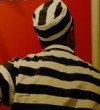Early in his illustrious career, Neil Simon was often criticized for the shallowness of his characters and the frivolity of his material. While these deficiencies seemed in no way to detract from audiences’ enjoyment of his plays, Simon responded by writing The Prisoner of Second Avenue, an apparently sincere effort to treat of more serious themes and more complex characters, albeit in a comic framework.
There can be little question about the seriousness of the material, now running at Flat Rock Playhouse. Mel Edison (Ken Krugman) is a middle-aged, middle-class, mid-level executive who has been abruptly fired from his job, and who for a while manages to conceal this fact from his super-humanly devoted wife, Edna (Trisha Gorman). That is, until he starts to lose his mind. As if to symbolize the poverty and misery that seems to lie ahead, the Edison’s Upper East Side apartment gets thoroughly burglarized — the bastards even take the valium stash. As appalling as these modern horrors may be, that’s not the end of it: There is also no running water, one of the upstairs neighbors is taking harassment to new levels and the doorman has begun to snicker. (And you thought you had it bad getting dropped from your health insurance.)
Add to these personal catastrophes a recurring radio news broadcast reporting rampant crime in the city and rumors of terrorist attacks, and all of this starts to sound eerily contemporary. Only the occasional mention of a salary figure or the cost of a home repair reminds us that the play is set in 1971. Rest assured, however, since this is a comedy, that all is not lost for Mel and Edna. In the end their love and resourcefulness (well, in particular, Edna’s love and resourcefulness) triumph over adversity. With a little rest and a lot of expensive psychotherapy, Mel is soon able gird up his loins and face the cold, harsh world once again, snow-shovel in hand.
The leading pair, Ken Krugman and Trisha Gorman, are fantastic together. They convey a natural ease and attentiveness, even in the midst of heated argument and mental breakdown, that expresses everything one might mean by the words “good marriage.” It’s true their characters’ gender roles and outlook are pretty thoroughly pre-feminist, but the respect and love Mel and Enda feel for each other is palpable, and it anchors the play. Likewise when, late in the play, Mel’s elder siblings show up to try to help, they too act out of the best of familial intentions — although with the usual mixed results. And even when, as happens at various points throughout, things veer into the brittle silliness of a TV sitcom, there’s still a human truthfulness at the center of the play. Mel’s suffering seems real, as does Edna’s concern for him.
Director Paige Posey (who also plays Mel’s sister Pearl) doubtless deserves much of the credit for this. She keeps the action tethered to reality, and leaves the actors room to develop their characters in depth. Gorman and, later, Peter Thomasson (who is delightful as the hyper-thyroidal older brother, Henry), make the most effective use of these opportunities. There are moments when Edna’s fear and exhaustion are laid bare with stirring simplicity, and Henry’s love for his younger brother, tainted as it is by resentment, burns clearly through the bluster.
If the show is marred here and there by scenery chewing, this is almost excusable: The scenery does look pretty delicious. Dennis Maulden’s set is gorgeously designed down to the last detail, and intelligently lit by Michael Mauren. (At one point, we even see lights go on and off in neighboring apartments as their occupants are roused by Mel’s raving.) All of this, combined with the elegant specificity of Allen Saunders’s sound design, further grounds the show in a convincing realism.
But is the show … well, funny? Just as much of the dialogue sounds a bit too much like dialogue, most of the jokes sound like jokes — that is, contrived in a way that will remind audiences of prime-time television. But that’s Neil Simon. Luckily, the show offers other kinds of humor as well, from slapstick (including a delightful bit involving a bucket of water) to situational comedy, all of it acted with fine precision and timing by the cast. (Saundra Cuyler is particularly hilarious in the supporting role of Pauline, Mel’s rather desiccated and miserly elder sister.) While the show offers precious few all-out belly-laughs, the chuckles come frequently enough to make for a very pleasant and entertaining evening of theatre.
The Prisoner of Second Avenue, by Neil Simon. Directed by Paige Posey. Associate Director: Sean Watkins. Technical Director: Bruce Bailey. Production Stage manager: Bill Muñoz. Lighting Design: Michael Mauren. Sceneic Design: Dennis Maulden. Costume Design: Ashli Arnold. Sound Design: Allen Sanders. Featuring: Ken Krugman, Trisha Gorman, Peter Thomasson, Paige Posey, Jane Bushway, and Saundra Cuyler. Show runs through November 20. Performances: Wednesday through Saturday at 8 p.m., Wednesday through Sunday (except Friday) at 2 p.m. Tickets $34. 828-693-0731.




Before you comment
The comments section is here to provide a platform for civil dialogue on the issues we face together as a local community. Xpress is committed to offering this platform for all voices, but when the tone of the discussion gets nasty or strays off topic, we believe many people choose not to participate. Xpress editors are determined to moderate comments to ensure a constructive interchange is maintained. All comments judged not to be in keeping with the spirit of civil discourse will be removed and repeat violators will be banned. See here for our terms of service. Thank you for being part of this effort to promote respectful discussion.